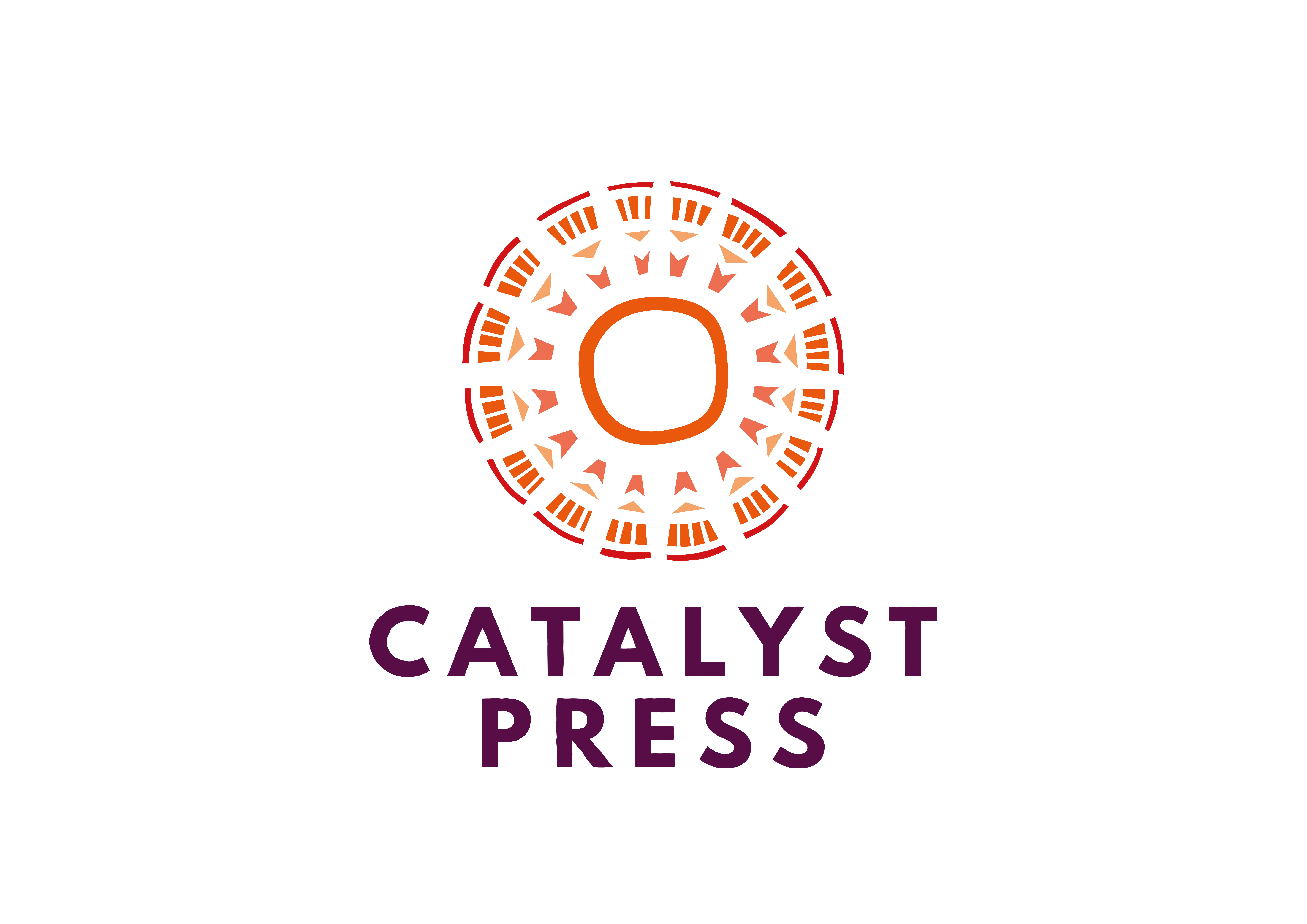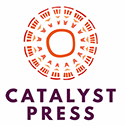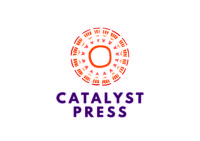While our authors make us special, without SarahBelle Selig and Izak de Vries as part of our team, Catalyst Press would be missing a huge part of its heart and soul. While our U.S. team members keep things humming a world away, these two have made us a truly international company. Whether through their connections with South Africa’s literary community, or with the kind of personal touch that only comes from a face-to-face meeting, they have helped build Catalyst South Africa into, what we hope, is a part of the local reading scene. We couldn’t do any of this without them. Ashawnta Jackson, a U.S.-based Catalyst team member, chatted to the pair about their work.

SarahBelle, can you tell us a bit about your role at Catalyst? What is the South African branch up to?
Specifically in South Africa, I’ve got a bit of a liaison role, which means I’m working face to face with our local authors, our South African distributor, and the many great booksellers and educators we’re connected with here. Izak and I also tag team our local publicity: everything from getting reviews for our authors in South African media, to getting them on panels at festivals.
We’re having so much fun at Catalyst South Africa these days! We’ve ramped up our events, from book launches and comics workshops, to author readings at local school libraries and even a beach cleanup. We hosted a booth at the inaugural Comic Con Cape Town to show off our amazing line up of African graphic novels and to connect with readers. We’re busy prepping the release of our first ever Afrikaans book for kids, and we’re actively building out our relationships with local nonprofits, bookstores, and schools. The Catalyst office is definitely the most active here that it’s ever been, I’d say.
Izak, you have a long relationship with the country’s literary scene. Can you tell us a bit about your background and how you use that in your work with Catalyst?
Many moons ago I lectured at the University of Venda. Theory of literature was one of my focal areas. Then our country began changing and the university got rid of many lecturers in the Arts Faculty. While teaching at the university, I began to teach myself HTML-coding, for there was this thing called the Internet (yes, we spelled it with a capital letter back then!). So, when I lost my job, I took up freelance work exploring this new thing.
One step took me to another and soon I was involved with developing online teaching aids. This got me commissions for more work in the education field. So, while my training was in literature, I soon became a project manager for major education projects. Oddly I found that we could make lovely books, but we had to tell people about the books. And so I started marketing books. I especially believe in influencer marketing. The internet, now without the capital, has opened up billboards on our digital highways that allow important, and very real, people to talk to our readers directly.
SarahBelle, you’re kind of a feet-in-two worlds person, being an American who now lives and works in South Africa. Is that something you’ve felt in your work, being able to be both inside and outside of the bookish community? And now that you’re, at this point, a long-term resident, how have you found space in the SA literary community, both as a writer and as a publicist?


I’m lucky because Catalyst already had a reputation here by the time I arrived, so that helped. People already had a sense of who we are and what we do. But yes, definitely, it was a learning curve—I think people underestimate just how much information you absorb when you grow up in a place. Even if you haven’t read them or visited them, you’re more familiar with authors’ names, you’ve heard of bookstores and publishers. You also just know the history and culture of a place, which of course plays out in the literary scene. I was starting from scratch in my twenties, so I had a lot of catching up to do (catch up that is still very much happening). All that said, the people in the book world here have never made me feel like an outsider and have been helping me tremendously with my South African cultural education. And from a professional standpoint, having come from the US publishing world (I was working in New York publishing before moving to Cape Town), I think that knowledge has helped me get my footing here, even if the two industries have many differences.
As for finding my place, I certainly feel I have. I’m very privileged to have a weekly writing group that means the absolute world to me, plus my MFA in Creative Writing cohort from the University of Cape Town, and an incredible network of bookish people who know me by name. I feel very at home here now, in a way that the publishing world in the States never quite felt for me.
One of the big things you bring to the table, Izak, is being bilingual. You’re fluent in both Afrikaans and English, which is wonderlik (did I get that right?) I’d love to know a little more about the Afrikaans book world, and ways that you’re working to connect Catalyst to those readers.
You got that right, Ashawnta!
Afrikaans literature has a long and proud history of opposing apartheid. White Afrikaans writers like Ingrid Jonker, Jan Rabie, Breyten Breytenbach, John Miles, Abraham de Vries, André Brink, Etienne van Heerden, Antjie Krog and many more actively opposed the apartheid regime, not only in their daily lives, but also in their work.
Authors of color, like Adam Small, were published and the plays were staged. There was one incident where Small’s play was to be staged, and he was not allowed into the theater! That caused fury. And so, literature in Afrikaans more or less equaled social justice.
More recently our younger Afrikaans authors, like Ronelda Kamfer, Ashwin Arendse and André Trantraal, have shown that one can continue to address social injustice in Afrikaans, even in a democracy. Being allowed to vote does not equate to equal access for people of colour; they write about it in Afrikaans.
This is for both Izak and SarahBelle, what’s something that you wish more people knew about the publishing world? What do you like best about the work?
SarahBelle: That turning down amazing work is the hardest part of the job! We have five times as many great manuscripts come in annually as we can publish, and that means we have to turn away a lot of books we’d love to say yes to. So if your manuscript gets denied by a publisher, please don’t take it personally! And keep trying. Sometimes, budgetary or time restraints could be the only difference between a no and a yes.
And the best part of the job? Well, the other day, I was sitting cross-legged on an author’s couch, dipping homemade rusks into hot coffee, chatting through the edits of her forthcoming book. That was pretty much peak happiness for me. Close second is when I get to play Father Christmas, and deliver the first copies of a book to its author. To witness that moment when they get to hold the finished book in their hand for the first time is an absolute privilege.
Izak: I guess making books is similar to making sausage. Perhaps it is best for the public not to know all the secrets.
Having said that, jokingly, I think it may benefit publishers if the public were to know how processes and tasks there are for every single title. That beautiful object you see in the store is the product of an incredible amount of people doing tough work.
But then that brings me to what I like: I do like it when authors and readers meet to celebrate a new arrival.

Aside from the books here in the Catalyst catalog, where are some good places for South African readers to find out about new books, authors, etc?
SarahBelle: Your local bookstores! That seems like an easy answer, but I’m not just talking about perusing the shelves; the booksellers here are so committed to local authors and they’re hosting events most days of the week. (The morning after a recent event, I popped back into the bookstore that hosted us to retrieve an item I left behind—and there was the bookseller, with her sleeves rolled up and a huge smile on her face, already busy setting up for another event.) They work so tirelessly to give readers great experiences and they never miss! So attend an event at your local bookstore, even if it’s not something you typically read. We’ve also got great festivals here across the country—big ones like Open Book, Franschhoek Fest, Midlands, Kingsmead, but also small ones like Blown Away by Books at Fish Hoek Library, or the SA Children’s Festival. We’ve got some amazing public libraries too.
Izak: SarahBelle has captured the essence extremely well. We have fantastic bookstores and book festivals in the country. Please support them!
From the US viewpoint, I’m always amazed by how many of our authors know each other, either personally or tangentially and how many authors who aren’t with Catalyst also have those sorts of relationships. It says a lot about the SA lit community; it’s small but mighty. Can you both talk a bit about how that tight-knit community helps you in your work?
SarahBelle: Oh gosh, I don’t know where I’d be without that community. Everyone involved in the literary community here—whether that’s booksellers, authors, fellow publishers, festival curators, aspiring writers, avid readers or loyal book-launch attendees—is always so keen to be involved, to help, to listen, to show up, to try something new. They give every book a proper shot. It makes my job easy, but it also makes my job fun.
Izak: Indeed. The sad part is we have a small reading community. The best part is that we have an incredible community that cares.
What types of books do you find yourselves gravitating to?
SarahBelle: For personal reading? Lately, it’s been a whole lot of fantasy! There’s nothing like crawling into bed at the end of a long day and escaping into a world so different to our own. And working with Catalyst has opened up a whole new world for me: comics and graphic novels, which I never really read as a kid. Now I feel like I’m catching up on so much lost time there. But at work, when I’m reading submissions, I’m always drawn to multi-generational sagas, multiple POVs, history and young adult fiction.
Izak: Gosh, I am quite eclectic in my reading. I have just finished off the last book in Lucinda Riley’s Seven Sister series. But I also read quite hectic literature. Barbara Kingsolver is a firm favourite.
In Afrikaans we have a remarkable range of authors, ranging from high literature, think Etienne van Heerden, to detective novels, think Deon Meyer, to historical novels, think Irma Joubert. Afrikaans has remarkable poets as well. I try to keep up!
What’s a Catalyst book you’d recommend to a reader who is unfamiliar with us to really get a sense of our publishing ethos?
SarahBelle: Out of our books that are available here in South Africa, I’d recommend Eye Brother Horn by Bridget Pitt for adult readers, The Cedarville Shop and the Wheelbarrow Swap by Bridget Krone for young readers, and our two newest graphic novels Pearl of the Sea and Kariba for… anybody, really. And we’re not the local publishers for these books, but we have taken them worldwide: if you haven’t read Sifiso Mzobe’s Young Blood (published by NB Publishers in South Africa), or Siphiwe Gloria Ndlovu’s City of Kings trilogy (published by Penguin Random House in South Africa), you must. We’re very lucky to be the North American publishers for those books and all of the other wonderful authors we’ve introduced to international readers.

Izak: Siphiwe Gloria Ndlovu is possibly our standard bearer at present. But I think The Lion’s Binding Oath by Ahmed Ismail Yusuf and Halley’s Comet by Hannes Barnard (published by Penguin Random House and Wenkbrou in South Africa) shows how our books capture Africa from the North to the South, how we look at the heartache and the beauty of this continent. Add Caroline Kurtz’s A Road Called Down on Both Sides, perhaps… O gosh, now I want them all!
What can readers expect in the future from our South African branch? Any exciting news to share?
SarahBelle: I’m so excited for the release of our first ever Afrikaans book, Dis net vel, my pel!, later this year. To me, that really cements us not just as a global publisher with a foot in South Africa, but as a genuinely South African press catering to South African readers. It’s our first release in a language other than English (though many of our titles are translated from other languages into English, such as Afrikaans and French) which I’m sure will bring both new challenges and opportunities.
Besides that, I’m really looking forward to operationalizing our new hybrid model, which will mean we’re able to publish more books a year and explore different genres, and I can’t wait to meet all of the amazing authors that will bring our way. And lastly, but perhaps the most exciting of all—one of our local authors here in Cape Town, Helen Brain, just received word that television rights for her Fiery Spiral trilogy (which is published by Human & Rousseau in South Africa and by Catalyst globally) were picked up by a South African production company. So that will be a fun project to follow!
Izak: SarahBelle has her finger on the pulse! I’d just like to say that the graphic novels produced here at present are amazing.
For publicity questions, review copies, or to get in touch with a Catalyst author: SarahBelle Selig at sarahbelle@catalystpress.org
For enquiries in Afrikaans contact Izak de Vries at izak@catalystpress.org


